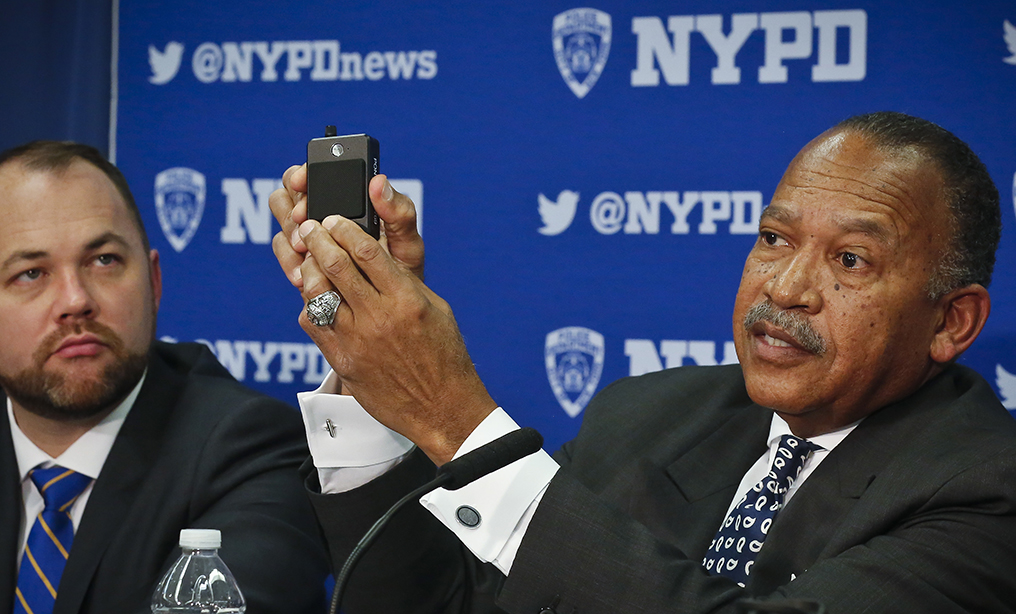Judge Orders NYPD Study Requiring Officers to Use Body Cameras Earlier in Encounters
U.S. District Judge Torres called for the program after a May report recommended officers begin recording during the lowest level of encounters with people.
August 10, 2018 at 02:42 PM
4 minute read
 New York City Council Speaker Corey Johnson, left, sit with NYPD Deputy Commissioner Benjamin Tucker during a press conference announcing a speed-up plan to equip all city police officers and detectives on patrol with body cameras in January. Photo: Bebeto Matthews/AP
New York City Council Speaker Corey Johnson, left, sit with NYPD Deputy Commissioner Benjamin Tucker during a press conference announcing a speed-up plan to equip all city police officers and detectives on patrol with body cameras in January. Photo: Bebeto Matthews/AP
A federal judge in Manhattan has ordered the first steps of a new body-worn camera pilot program for the New York City Police Department, which will study requiring officers to engage their cameras at an earlier stage in encounters with people.
Late Thursday, U.S. District Judge Analisa Torres ordered the parties in the set of cases under Floyd v. City of New York to submit a joint proposal for a new pilot to study the impact of officers activating cameras during so-called Level 1 stops.
These stops are the most basic interactions police can have, requiring only an objective credible reason to approach a person. Yet, as Torres noted, the pilot program currently in place with the department does not require officers to engage their cameras until a Level 2 stop, where officers have a founded suspicion of criminality.
Advocates and attorneys for the plaintiffs in the collected cases call the order a win in their efforts to ensure the police department is complying with the court's orders on the department's stops policy.
“There's clearly an underreporting, and I would even say a massive underreporting, of stops,” said Beldock Levine & Hoffman partner Jonathan Moore, an attorney for the Floyd plaintiffs. “I think it reflects the court's understanding … that there's a serious underreporting problem, and it's got to be addressed somehow.”
A report to the court in May on the recent history of police and community relations recommended that patrol officers be required to activate their cameras during Level 1 encounters. As Torres noted, the report's author stated that Level 1 encounters feel like detaining stops to those approached by the police, and that “many investigative encounters quickly escalate” to higher-level encounters requiring body-camera activation.
The NYPD opposed the recommendation, arguing in a filing quoted by Torres that “[r]ecording Level 1 encounters has serious privacy implications and may have a chilling effect on community-police interactions.”
Torres' order, then, sets Oct. 19 for the joint proposal, which will include a plan to assess whether activation at Level 1 enhances the department's ability to capture encounters that escalate and a plan for considering the concerns expressed by the department.
Spokesmen for the NYPD and the city's Law Department did not provide a comment when requested.
The body-worn camera pilot program was implemented after the court found in 2013 that the NYPD had violated the constitutional rights of people subjected to its stop-and-frisk program. Specifically, the decision, by retired U.S. District Judge Shira Scheindlin, said the department engaged in a policy of indirect racial profiling.
As part of the remedies, the department was instructed to start a pilot program for the use of body-worn cameras, which has been supervised by the monitor overseeing the court's order, Peter Zimroth.
Under Mayor Bill de Blasio, the use of body-worn cameras has been on a fast track, with the mayor's office announcing in January that all officers on patrol would be equipped with the cameras by the end of 2018, a year earlier than planned.
Torres' order on the body-camera pilot program comes on the heels of another order in July for another pilot program based on a recommendation from the May report to the court regarding the documentation of Level 1 and 2 police encounters. Currently, only encounters at the top two levels in the four-level framework are required. The author's report indicated doing so was essential to understanding “the extent to which police are initiating encounters on the basis of race.”
For Beldock Levine's Moore, the two recommendations are tandem efforts by the court to determine, four years after Floyd was decided, whether the police department was fully complying with the court's orders.
“Everybody accepts the proposition in these cases that there's no reliability of the [stop] statistic that are occurring on a yearly basis,” Moore said. “These two pilot programs that [Torres has] ordered are really designed to determine if there's a way to create a reporting scheme that ensures all stops are being recorded, that all encounters are being reported.”
This content has been archived. It is available through our partners, LexisNexis® and Bloomberg Law.
To view this content, please continue to their sites.
Not a Lexis Subscriber?
Subscribe Now
Not a Bloomberg Law Subscriber?
Subscribe Now
NOT FOR REPRINT
© 2025 ALM Global, LLC, All Rights Reserved. Request academic re-use from www.copyright.com. All other uses, submit a request to [email protected]. For more information visit Asset & Logo Licensing.
You Might Like
View All

Cooley Promotes NY Office Leader to Global Litigation Department Chair

NY Judge Resigns After Avoiding Jury Duty by Telling Court He Couldn't Be Impartial

Charlie Javice Jury Will Not See Her Texts About Elizabeth Holmes
Trending Stories
- 1Pistachio Giant Wonderful Files Trademark Suit Against Canadian Maker of Wonderspread
- 2New York State Authorizes Stand-Alone Business Interruption Insurance Policies
- 3Buyer Beware: Continuity of Coverage in Legal Malpractice Insurance
- 4‘Listen, Listen, Listen’: Some Practice Tips From Judges in the Oakland Federal Courthouse
- 5BCLP Joins Saudi Legal Market with Plans to Open Two Offices
Who Got The Work
J. Brugh Lower of Gibbons has entered an appearance for industrial equipment supplier Devco Corporation in a pending trademark infringement lawsuit. The suit, accusing the defendant of selling knock-off Graco products, was filed Dec. 18 in New Jersey District Court by Rivkin Radler on behalf of Graco Inc. and Graco Minnesota. The case, assigned to U.S. District Judge Zahid N. Quraishi, is 3:24-cv-11294, Graco Inc. et al v. Devco Corporation.
Who Got The Work
Rebecca Maller-Stein and Kent A. Yalowitz of Arnold & Porter Kaye Scholer have entered their appearances for Hanaco Venture Capital and its executives, Lior Prosor and David Frankel, in a pending securities lawsuit. The action, filed on Dec. 24 in New York Southern District Court by Zell, Aron & Co. on behalf of Goldeneye Advisors, accuses the defendants of negligently and fraudulently managing the plaintiff's $1 million investment. The case, assigned to U.S. District Judge Vernon S. Broderick, is 1:24-cv-09918, Goldeneye Advisors, LLC v. Hanaco Venture Capital, Ltd. et al.
Who Got The Work
Attorneys from A&O Shearman has stepped in as defense counsel for Toronto-Dominion Bank and other defendants in a pending securities class action. The suit, filed Dec. 11 in New York Southern District Court by Bleichmar Fonti & Auld, accuses the defendants of concealing the bank's 'pervasive' deficiencies in regards to its compliance with the Bank Secrecy Act and the quality of its anti-money laundering controls. The case, assigned to U.S. District Judge Arun Subramanian, is 1:24-cv-09445, Gonzalez v. The Toronto-Dominion Bank et al.
Who Got The Work
Crown Castle International, a Pennsylvania company providing shared communications infrastructure, has turned to Luke D. Wolf of Gordon Rees Scully Mansukhani to fend off a pending breach-of-contract lawsuit. The court action, filed Nov. 25 in Michigan Eastern District Court by Hooper Hathaway PC on behalf of The Town Residences LLC, accuses Crown Castle of failing to transfer approximately $30,000 in utility payments from T-Mobile in breach of a roof-top lease and assignment agreement. The case, assigned to U.S. District Judge Susan K. Declercq, is 2:24-cv-13131, The Town Residences LLC v. T-Mobile US, Inc. et al.
Who Got The Work
Wilfred P. Coronato and Daniel M. Schwartz of McCarter & English have stepped in as defense counsel to Electrolux Home Products Inc. in a pending product liability lawsuit. The court action, filed Nov. 26 in New York Eastern District Court by Poulos Lopiccolo PC and Nagel Rice LLP on behalf of David Stern, alleges that the defendant's refrigerators’ drawers and shelving repeatedly break and fall apart within months after purchase. The case, assigned to U.S. District Judge Joan M. Azrack, is 2:24-cv-08204, Stern v. Electrolux Home Products, Inc.
Featured Firms
Law Offices of Gary Martin Hays & Associates, P.C.
(470) 294-1674
Law Offices of Mark E. Salomone
(857) 444-6468
Smith & Hassler
(713) 739-1250






